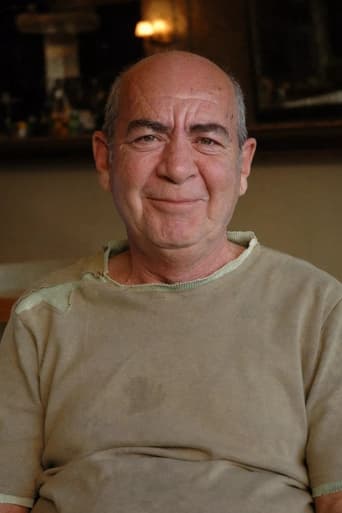Lovesusti
The Worst Film Ever
Forumrxes
Yo, there's no way for me to review this film without saying, take your *insert ethnicity + "ass" here* to see this film,like now. You have to see it in order to know what you're really messing with.
Jonah Abbott
There's no way I can possibly love it entirely but I just think its ridiculously bad, but enjoyable at the same time.
Lucia Ayala
It's simply great fun, a winsome film and an occasionally over-the-top luxury fantasy that never flags.
danbes
While there's nothing wrong with creating a film that says life is pretty much a drag for young people who are innocent victims of their parents and grandparents traditional ways, this film beats the theme to death. For me, the film primarily rings with one quality: hopelessness. Filled with symbolism designed, I believe, to express the filmmaker's view that the preadolescents we meet are pretty much resigned to life as it is, and without even a hint that they have any way out of their situation, the film, while photographed beautifully, and with competent acting by most of the characters, emerges as little more than a turgid overview of a rural life that few westerners have been witness to on the screen. There are far better films that do the same thing. I think of Bicycle Thieves, of the Apu trilogy, of Sugar Cane Alley, and of several other titles that bare witness to humans (young people especially) living lives of "quiet desperation" (as Thoreau put it), but which do so in ways that indicate the reasons, and which also present their characters as people who at least make an attempt to struggle against a situation they little understand and of which they are the victim. Don't avoid the Times and Winds. See it, but do so as a lesson in how an inadequate film could have been so much more.Dan Bessie /
[email protected]
Pierre Radulescu
A tiny poor village of a few hundreds, surrounded by rocky cliffs. Goats and olive trees, as everywhere in the region. The Black Sea can be seen from the cliffs, having the changing color of the sky, gray when it's windy, blue when it's sunny. Poverty of the place continuing in the majesty of the landscape, village life mastered by the moods of nature. The five times of prayer, midnight, morning, noon, afternoon, evening, are just brief moments to realize that you are at the mercy of what time brings.This is Kozlu, the birthplace of Turkish director Reha Erdem, and Bes Vakit (Times and Winds, made in 2006) is about this village and these cliffs, about the moods of weather and the times of prayer, and about these people.It is a movie full of love for this universe while devoid of any sentimentalism. The magnificent surroundings, the cliffs and the sea in close distance, pictured with awe, the poor village pictured with love, you feel this tenderness flowing from the screen; where the movie becomes unsentimental is when picturing the moods of people. They are his people, the guys of his village, the director is one of them, it is his universe. It is here love and lucidity. From the elders to the young, they are too challenged by these times and winds, to find space for kindness to one another. The elders are authoritative to the point of arbitrariness, the children grow up feeling the unfairness of the elders, hating them, childishly wishing their death. Three children of some eleven, twelve years are the main characters of this movie. On the threshold of puberty, a coming of age through frustration and resentment, balanced eventually by the miracles of nature they are witnessing. The unexpected coming and going of storms and winds will slowly teach them about the relativity of everything. The animal mating will be an abrupt lesson about the ultimate simplicity of love. The birth of a baby will show them the beauty of life despite all odds. The approaching of death of the father will make the boy suddenly and painfully realize what fear means, the terrible fear of loosing his father, how stupid his hate has been, his wish to see him dead.
cgyford
Celebrated Turkish writer-director Reha Erdem followed the international success of his previous films "Kaç para kaç" and "Korkuyorum Anne" with this mesmerising cinematic study of rural daily life in the Turkish hinterland which took home top awards at both the Istanbul and Adana Golden Boll International Film Festivals and secured international distribution.Özkan Özen proves a surprisingly talented young lead with powerful support from fellow youngster Ali Bey Kayalı and Elit İşcan who all seem incredibly natural in there roles whilst Bülent Emin Yarar heads up the adult supporting cast which includes fellow Erdem regular Taner Birsel, Yiğit Özşener and the gorgeous Selma Ergeç.The talented filmmaker takes his title, which translates as "five times", from the 5-times daily call to prayer that regulates the daily life of the Turkish peasants at the core of this film and divides up Florent Herry's exquisitely cinematography accordingly as it flows from character to character pausing each time to take in the gorgeous Çanakkale countryside.Can you sing the call to prayer?
Robert_Woodward
Times and Winds is a portrait of family life in rural Turkey centred on the lives of three young children: Omer, Yakup and Yildiz. The village that they live in is a slightly ramshackle affair; many houses are showing their age and the cobble roads are worn and wonky. The surroundings, on the other hand, are sumptuously beautiful, ranging from lush green woodland to spectacular rocky cliffs and the gloriously shining sea. Director Reha Erdem uses Steadycam to track the characters as they travel through the village and the countryside, creating a sense that the little settlement and its grand surroundings are a seamless, congruous whole.The village, however, is not a harmonious place: there is great distrust between different generations, from the oldest to the youngest, and Omer, Yakup and Yildiz are caught up in this. The three young children all earn the displeasure and disappointment of their elders, and in turn become disillusioned and resentful.Omer's father, a local imam, is ever disappointed with his eldest son, and does little to hide his preference for Ali, Omer's bright younger brother. Omer begins to devise ways of killing his father, who is already suffering under the effects of a disease. Meanwhile, Yakup, Omer's close friend, is upbraided by his father, the muezzin, for trying to steal cigarettes, but finds – to his dismay – that he is being lectured by a moral hypocrite. The women in the village are not free from this futile cycle where the old alienate the young and the young resent the old: Yildiz, an intelligent young girl, has to look after her baby sibling on behalf of her mother, and suffers increasingly under the stress of this responsibility.It is no wonder that in their complicated, unrewarding family lives these children yearn for an escape, and so they gather together in the wilderness around their village to plot and play and dream. Recurring images show the young children lying prone – dead or asleep – out in the wilderness, a sad reflection of a world where they already feel like a disappointment.That is not to say that this is a wholly bleak portrait of life in rural Turkey. It is cheering to see the work done by the village committee members, who gather together to discuss pressing local issues. They condemn the beating of a local shepherd boy by his acting father and they organise the building of a new roof for an elderly lady as the winter sets in. There are also some very funny moments in Times and Winds, including the scenes where the children giggle over procreating animals. Even these scenes, however, are ultimately permeated with the same sadness found throughout the film: the boys catch the girls watching a pair of copulating horses and chase them away, in the belief that girls should not be allowed to see such things. In a place where religious figures such as the imam and the muezzin fall far short of the lofty ideals to which they aspire it is sad to see the wrong-headed behaviour inspired in these children.The film finds the perfect accompaniment in the music of Finnish composer Arvo Part. The sombre, haunting strings that swell periodically throughout Times and Winds mingle with the sounds of nature and of everyday life, and fittingly reflect the torment of human relationships against the most serene and beautiful of backdrops. Though nearly two hours long and driven by only the loosest of plots, Times and Winds does not feel like a slow film. There are so many characters and incidents that the film can be a little confusing in places, but it is relentlessly engaging. Times and Winds is all the more remarkable film for having come seemingly out of nowhere and it will hopefully win some much-deserved attention for new Turkish cinema.



